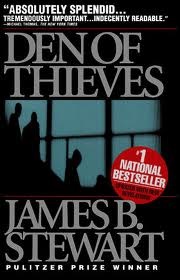 Wall Straits's "The Prehistoric Investor" book was written by its founder Curtis J. Montgomery. The book talks mostly about human's prehistoric mindset (i.e caveman) vis-a-vis modern stock market. How our mind works and how it did and did not evolve from our caveman mentality.
Wall Straits's "The Prehistoric Investor" book was written by its founder Curtis J. Montgomery. The book talks mostly about human's prehistoric mindset (i.e caveman) vis-a-vis modern stock market. How our mind works and how it did and did not evolve from our caveman mentality.One of the many extracted quotes inside caught my attention. It is concept thats so true in human; beautifully explained and expressed by Thomas Schelling, an Economist.
How should we conceptualize this rational consumer whom all of us know and who some of us are, who in self-disgust grinds his cigarettes down the disposal swearing that this time he means never again to risk orphaning his children with lung cancer and is on the street three hours later looking for a store thats still open to buy cigarettes; who eats a high calorie lunch knowing that he will regret it, does regret it, cannot understand how he lost control, resolves to compensate with a low calorie dinner, eats a high calorie dinner knowing he will regret it, and does regret it; who sits glued to the TV knowing that again tomorrow he'll wake early in a cold sweat unprepared for that morning meeting on which so much of his career depends; who spoils the trip to Disneyland by losing his temper when his children do what he knew they were going to do when he resolved not to lose his temper when they did it?
People behave sometimes as if they had two selves, one who wants clean lungs and long life and another who adores tobacco, or one who wants a lean body and another who wants dessert, or one who yearns to improve himself by reading Adam Smith on self-command. The two are in continual contest for control.
Thomas Crombie "Tom" Schelling (born 14 April 1921) is an American economist and professor of foreign affairs, national security, nuclear strategy, and arms control at the School of Public Policy at University of Maryland, College Park. He was awarded the 2005 Nobel Memorial Prize in Economics (shared with Robert Aumann) for "having enhanced our understanding of conflict and cooperation through game-theory analysis."
Schelling received his bachelor's degree in economics from the University of California, Berkeley in 1944. He received his PhD in economics from Harvard University in 1951.





Post a Comment